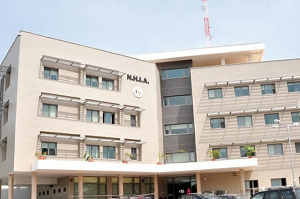Health News of Saturday, 2 March 2024
Source: www.ghanaweb.live
2024-03-02NHIA disburses GHC130M to healthcare providers
 National Health Insurance Authority (NHIA)
National Health Insurance Authority (NHIA)
Ghanaian
The National Health Insurance Authority (NHIA) has disbursed GHS 130,244,000 ($27.7 M) to 4,850 healthcare service providers across Ghana.
The authority has successfully reduced the claims payment arrears to just two months, with the most recent payments made on February 13, 2024.
NHIA also introduced the "Sunshine Policy" to enhance accountability, social auditing, and transparency with regards to claims
Read full articlepaid monthly.
Additionally, the World Bank Group has signed an agreement with NHIA, making available GHS 27.7 M to increase the National Health Insurance Scheme (NHIS) annual active membership and facilitate claims processing and payments for primary healthcare providers.
To access the funds, NHIA must meet the Disbursement Linked Result (DLR) targets, including expanding the number of active members of the Scheme and digitizing the claims management process to enable the prompt payment of claims within a stipulated time.
However, the Authority has cautioned healthcare service providers to refrain from charging patients for drugs covered under the NHIS package.
The NHIA Governing Board and Executive Management have served notice to suspend 81 identified credentialed health facilities involved in unauthorized charges 'Copayments.' Such practice is a clear violation of Section 35(1) of Act 852 and point 16.0 on "forbidden conduct" in the Master Provider Service Agreement.
NHIA has issued a directive to enforce clause 15 of its contract with healthcare providers, allowing the Authority to make deductions from claims submitted as a Return of Payment for Services otherwise covered under the Scheme but charged to members. The Authority will refund all such monies to the aggrieved members after investigations are conducted.
The Authority stated that it is working to reduce Ghana's NHIS Policy's unintended out-of-pocket payments, which could lead to catastrophic health expenditures, especially for the poor and vulnerable.











